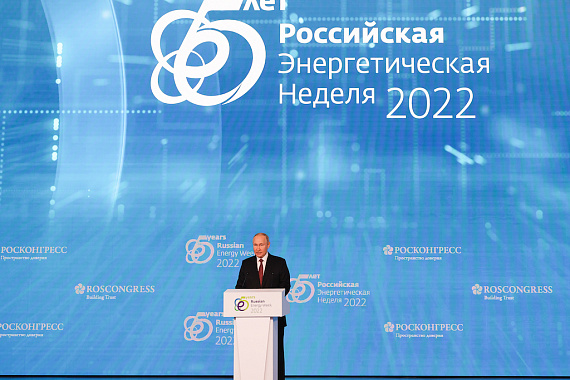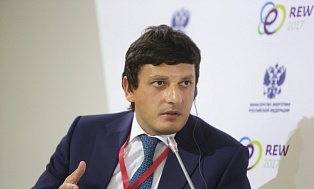New Challenges, New Opportunities: What’s in Store for the Oil and Gas Market?

Key conclusions
The energy crisis is driven by systemic causes and is affected by actions of a whole number of western countries
“The global energy industry is now facing unprecedented challenges and problems. The short-sighted and erroneous actions by a number of Western countries have been pushing the international community into this situation for years. Despite the sanctions and sabotage of infrastructure, we do not intend to cede our positions. We will continue to ensure stable energy security and expand ties with countries that are interested in this. Its [the intact branch of Nord Stream 2, – Ed.] capacity is 27.5 billion cubic metres per year, which is about 8 percent of Europe’s gas imports.
Russia is ready to begin deliveries. The ball is in the EU's court. If they want to, they can just turn on the tap and that is that. I repeat that we are not restricting anyone or anything, and are ready to supply additional volumes in the autumn and winter period,” Vladimir Putin, President of the Russian Federation.
“The intentional policy of many years has been to give up Russian gas. In this case, the European Union first adopted an energy package, then another one and then the so-called third one aimed to split the infrastructure owner and the energy owner – gas, for example. It is not entirely clear why they did it, because in the case of such pipelines as Nord Stream, TurkStream or Yamal–Europe there can be no other supplier but Russia, Gazprom that could use this infrastructure,” Alexander Novak, Deputy Prime Minister of the Russian Federation.
Green energy transition cannot be fast
“Today, natural gas is viewed as one of the key energy resources that will be significant for the countries’ short-term social and economic development and for the energy transition. So, it sends us the message that in the next two decades natural gas will play an important role as a crucial component of the energy transition,” Parviz Shahbazov, Minister of Energy of the Republic of Azerbaijan.
“As of today, switching 100% to renewable energy sources is not possible. Yes, of course, green energy is rapidly developing, but that perspective is too remote and unreal under current conditions. Green energy does not mean uninterruptible power supply. This is why any country that is trying to give up fossil fuels and traditional energy sources subjects itself to major problems. We will ensure our energy security through traditional energy sources,” Fatih Donmez, Minister of Energy and Natural Resources of the Republic of Turkey.
Problem
Uncertainty at global oil and gas markets
“The global economy in general, the fuel and energy sector are in the middle of, let me be direct, an acute crisis due to unstable price dynamics of energy resources, an imbalance in supply and demand, and the overtly subversive actions of individual market participants, who are guided solely by their own geopolitical ambitions. Incidentally, according to expert estimates, this year alone, the spot gas pricing mechanics have caused Europe more than 300 billion euros in losses – about 2 percent of the Eurozone’s GDP,” Vladimir Putin, President of the Russian Federation.
“We are witnessing unbalanced supply and demand on the market. We see that many markets are experiencing a deficit of energy resources. We are primarily referring to the European market, where we see a deficit of gas, electric energy, coal, and petrochemicals,” Alexander Novak, Deputy Prime Minister of the Russian Federation.
“One of the key things that always leads to a crisis is a long-term lack of stable conditions and rules. It results in unpredictability, when consumers are unable to forecast their volumes of commodities, including hydrocarbons. By the same token, producers experience uncertainty and inability to invest steadily,” Bolat Akchulakov, Minister of Energy of the Republic of Kazakhstan.
Solutions
Russia will not act contrary to common sense and supply energy to the countries that introduce price caps
“Russia will not act contrary to common sense or underwrite someone else’s prosperity. We are not going to supply energy to the countries that introduce price caps,” Vladimir Putin, President of the Russian Federation.
“We will not do anything to harm our economy or our mining companies and supply energy to the countries that will limit us and interfere with market pricing mechanisms. We have discussed this with our companies. The companies say that this precedent cannot even be evaluated. Interference is a precedent that cannot be allowed, as it may concern not just Russia, but other producers and suppliers of not just energy. It can create chaos in the global economy, as well as even higher uncertainty and volatility,” Alexander Novak, Deputy Prime Minister of the Russian Federation.
Payments for energy in national currencies and considering other supply lines
“We will continue the transition to settlements in national currencies when delivering Russian energy resources. I have already mentioned one such instance where Gazprom and its Chinese partners decided to switch to the rouble and the yuan in equal proportions when paying for supplied gas. Some European partners have also transitioned to payment in roubles for our gas. we will be expanding the geography of our deliveries, identifying key pieces of infrastructure for doing so and building them, including promising projects such as Power of Siberia-2 and its Mongolian section Soyuz Vostok. We could move the lost volume of transit through the Nord Stream pipelines along the bottom of the Baltic Sea to the Black Sea region and thus make Turkiye the main route for the supply of our fuel, our natural gas to Europe and create a major gas hub for Europe in Turkiye, if, of course, our partners are interested in seeing this happen,” Vladimir Putin, President of the Russian Federation.
“We are witnessing the shift of energy flows from old markets to new ones, which will increase transportation and other costs. It is a problem… that needs a solution, launching new logistics chains, legitimation and the transformation of new energy flows,” Alexander Novak, Deputy Prime Minister of the Russian Federation.
“We have a prepared resource portfolio both in East Siberia and – I will emphasize – in West Siberia. We can increase the volumes supplied to Asian markets as soon as possible. We have a contract for supplying gas from the Far East to China. At the moment, we are developing design and estimates for building a pipeline from Russia to China through Mongolia and for Power of Siberia-2. It will increase our export potential to Asia,” Alexey Miller, Chairman of the Management Committee, Deputy Chairman of the Board of Directors, Gazprom.
For more information, visit the Roscongress Foundation’s Information and Analytical System roscongress.org and the official Forum website rusenergyweek.com.





